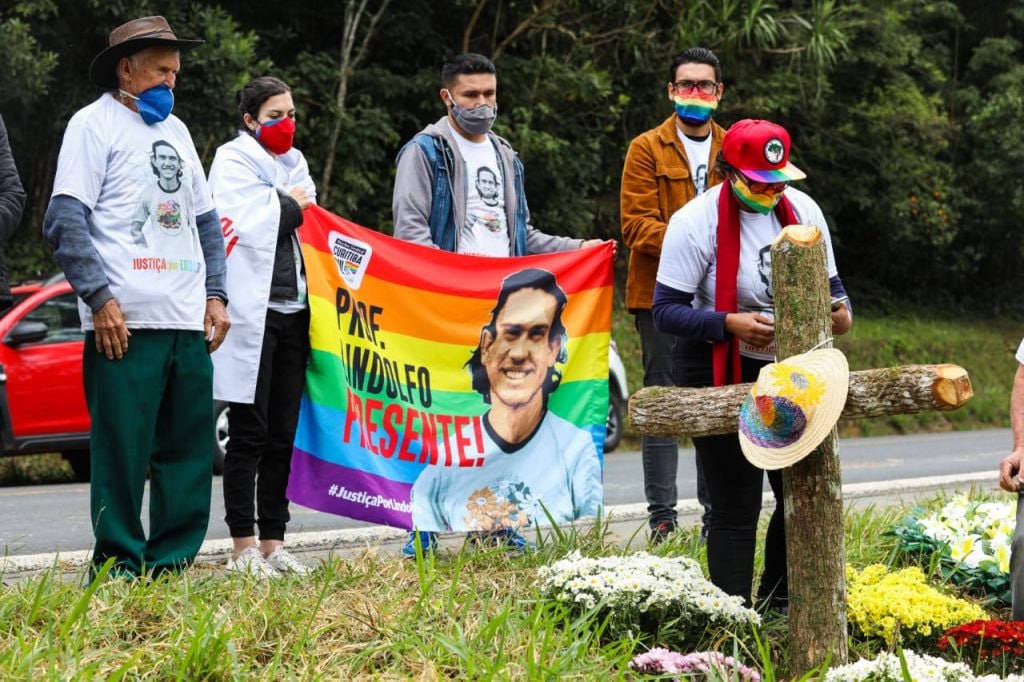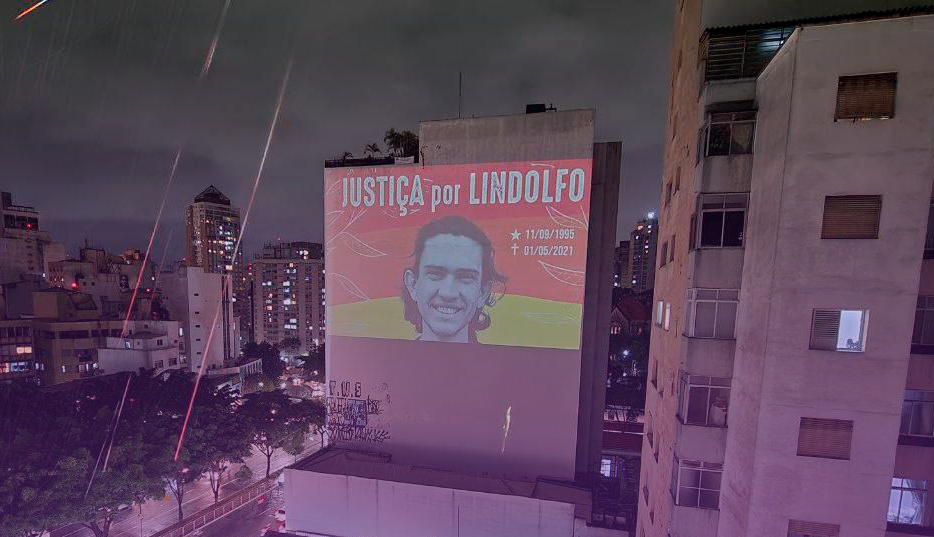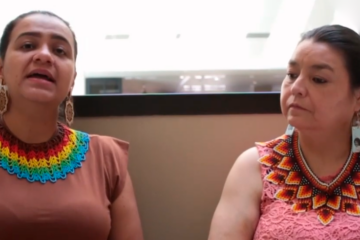The path toward profound social change includes the right to sexual and gender diversity. More and more, rural LGBT+ people are demanding a disruption of the current system that criminalizes and kills them, and they include this topic in the agenda of social movements’ unremitting struggle. Within grassroots rural movements, the struggle for LGBT+ rights is combined with the struggle for food sovereignty in the pursuit of a just world, with freedom and diversity, and equal relationships between people and nature.
In Brazil, solidarity has been at the center of the struggle against LGBTphobia in rural areas. On May 1st, 2021, Lindolfo Kosmaski, a member of the Landless Workers’ Movement (Movimento dos Trabalhadores Rurais Sem Terra—MST), was brutally murdered at age 25. Ever since, La Via Campesina and ally grassroots movements have been echoing Lindolfo’s voice and his struggle, in pursuit of justice. Lindolfo was a teacher and an activist with the MST LGBT+ Collective. We spoke with Luana Oliveira, a member of the MST and La Via Campesina LGBT+ Collective, about Lindolfo’s case and the diversity of the LGBT+ struggle within the movement.
One example of an LGBT+ person that came from the countryside and stayed in their territory struggling and educating other people is Lindolfo Kosmaski, who was brutally murdered two years ago. What is the struggle for justice in this case like and how does La Via Campesina in Brazil argue that a case like this should be conducted to get justice?
The struggle for justice in Lindolfo’s case has been going on since the murder happened. The mobilization and awareness raising among society reverberated a lot in Brazil and other countries in Latin America and Europe. In demonstrations in the United States, Spain, France, and Argentina, for example, we would see posters calling for justice for Lindolfo, content on social media. These demonstrations were not overlooked by the population of the small town of São João do Triunfo, Paraná, where Lindolfo lived and was murdered.
The trial started at 10 a.m. on April 18th. Lindolfo’s siblings, his friends, the owner of the bar where he was last seen and one of the people who gave an anonymous tip were there as witnesses and declarants. That was very helpful for the person in charge of the investigation during the process of accusing the murderer. Defense and prosecution started their arguments in the early evening, after the defendant testified. The trial lasted 16 hours, and Lindolfo’s family was there the entire time. At 2:45 a.m. on April 19th, the judgment was delivered, and the defendant was sentenced to 19 years and 6 months in prison.
La Via Campesina Brazil understands that the project of society we struggle for and dare to build must consider that all human beings—of all colors, races, ethnicities, and beliefs—must live and be free to love.
Sexual freedom and diversity are also part of this project of freedom for land, food production, and healthy human relationships.
In a case such as Lindolfo’s and any other case where there is an attack on a human being’s life, justice must be served, from investigation to conviction, when the culprits are found. Rural social movements have been denouncing cases of violence, following the investigation when it is allowed, and holding mobilizations. More than ever, we have been echoing the voices of those who have been silenced by violence, in a continuous exercise of always remembering our martyrs through mística, songs, poetry. We keep on dreaming, as do the seeds that hope to sprout and bear good fruits, spreading other seeds. “Land and blood” must not be terms connected to the violence perpetrated against the peoples of rural, water, and forest communities—they must mean resistance, food production in conflict-free territories, as a synonym of life.

LGBTphobia is a symptom of conservatism that rules this capitalist and heteropatriarchal world. The murder of Lindolfo happened in a moment when conservatism was supported by government officials as well as by the advances of agribusiness. Does this context change as the administration changed? How do we continue to fight conservatism and its impacts on the lives of LGBT+ people?
This context will not suddenly change just because the current Brazilian administration has a more democratic positioning. The LGBTI+ population must continue to take a stand, expressing their demands and struggles. That happened in the past during left-wing administrations, and we must continue to do so, to be continuously vigilant, aware and wiling to fight against all and any forms of violence.
The LGBT+ struggle is diverse and is faced with many different challenges around the world. For La Via Campesina, what is the process of politically building this struggle like within rural movements?
Sexuality is usually considered a huge taboo in rural areas. We assert how important it is for peasant movements and organizations to include the topic of sexual diversity and gender identity in the struggle for social rights, building an ignorance-free path. It’s important to disrupt the prejudices that feed the project of capital and lead to discrimination and violence against women and LGBTI+ people. The organizations with La Via Campesina have the great task of showing how these kinds of violence are not natural, acknowledging the existence of LGBTI+ people and centering their struggles around the respect to sexual diversity and gender identity.
How can these struggles overcome the discourse around sexuality as a simply individual thing, and shape them as a collective struggle to ensure rights and fight the hatred endured by the LGBT+ population?
Peasant struggles in Brazil have also experienced an increase in violence rates in recent years. According to the Conflicts in the Countryside in Brazil report by the Pastoral Committee on the Land (Comissão Pastoral da Terra—CPT), in 2019, 32 peasants were killed [in the country]. We know that an order given to murder an Indigenous person or a peasant derives from the same fascist and LGBTIphobic thought that kills these people.
We believe that we must refuse moralistic classifications and determinations about our bodies, pleasure, and desire, because all forms of love are legitimate and make up the identity of the working class.
There’s a common idea that young people from rural areas have to move to big cities to have more opportunities. In the context of LGBT+ people, this way out may also be seen as a way to freely live their sexuality. How is it possible to make sure rural areas are a safe place for these people, so that they don’t have to leave?
We believe there must be a project for the countryside that includes LGBTI+ people, so that they stay and live in rural areas, growing on the land and being sure they can be, live, love, and be happy taking part in community life. As we struggle for food security and sovereignty, energy sovereignty, and the empowerment of peasant communities, it is also necessary to build territories free from prejudice and discrimination on the basis of gender, race/ethnicity, sexual orientation, and gender identity, and face the challenge of actually breaking all the fences that deprive us from living and loving.




